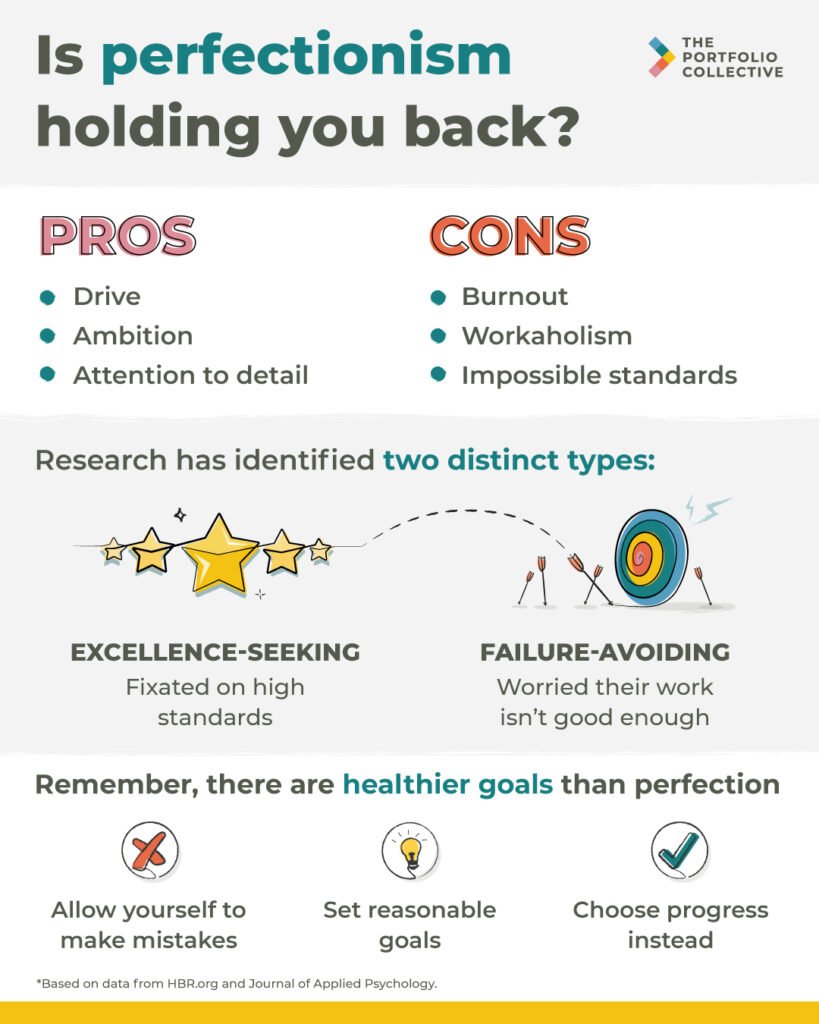Nika Talbot
When I told my sister I was writing an article on perfectionism, she laughed. In her words, I was “the perfect person to do it!” She wasn’t wrong.
I sat there planning with fifteen tabs open, looking at different research articles, checking subreddits and listening to a podcast with Brene Brown on vulnerability and shame. I know myself well enough by now to recognise the symptoms: the urge to include everything that’s ever been written on the subject, shoulders up by my ears and my heavy backpack on. And then the inner voice pipes up, “you’re taking too long on this, stop procrastinating and get on with it. A proper writer would have it done in half a day.” And so it goes… hello, toxic perfectionism.

I struggle with it, and I’m not alone. A quick Google search throws up numerous questions, articles, threads, memes and cries for help. It starts young, and research shows it’s on the rise with each generation becoming more perfectionist, suggesting it’s a cultural issue – not just genetic.
Sadly, that doesn’t mean we’re becoming more accomplished, just that we’re holding ourselves back from being successful and productive. Perfectionism is a double-edged sword – it can motivate us to deliver flawless work and aim for excellence, but it also makes us anxious, slows us down and drives people nuts. So what can we do to keep it in check?

The expert view – what is perfectionism?
Gordon Flett and Paul Hewitt are authorities in the field and have been studying perfectionism for decades. They say, “[it] is a broad personality style characterised by a hypercritical relationship with one’s self.” The root of perfectionism is basing your self-worth on your achievements – you may have had high parental expectations, shaming parents or experienced conditional love based on achievement.
They defined three types in a landmark study published almost 30 years ago: self-oriented, other-oriented, and socially prescribed perfectionism (more on the perils of perfectionism and how we can prevent it in their lab video).

Thomas Curran and Andrew Hill have also been researching perfectionist culture in the UK and US since the 90s and say more of us are experiencing the three types simultaneously. The latter – socially prescribed is the most damaging. We don’t feel valued in social situations, have a strong need for approval, and believe others judge us.
There are health consequences too. If we see ourselves as less than, we may push ourselves even further to overcome it, leading to higher levels of burnout, stress, workaholism, anxiety and depression. In other words, the human brain is complicated.
How to plan your escape from the black hole of perfectionism

Over the years, I’ve developed strategies to help me battle my perfectionism demons as I have to eat, meet deadlines and set a good example for a teenager who’s about to enter the world of work. Here are just some of the ways I overcome it.
1. See the bigger picture
“Recognize the opportunity cost and time” of your behaviours, says productivity coach Matt Plummer, founder/CEO of Zarvana. Is spending another hour on that document a good use of your time? Does it help the bottom line? Show your work earlier in the process – your first draft may already be good enough, and you don’t need to spend more time on it. The feedback you get will improve it.
2. Create a process and break down your goals
Perfectionism is related to a fear of uncertainty, so create a guide with measurable steps you can tick off when they’re done. Get the basics down, e.g. if you’re writing an article, make a skeleton structure with a header, intro and bullet points to help build momentum.
3. Stop ruminating
Alice Boyes, the author of The Healthy Mind Toolkit and The Anxiety Toolkit, told HBR.org that perfectionism is related to anxiety and being harder on ourselves. It’s unhealthy and unproductive, so find ways to break the cycle and identify your triggers and patterns. Don’t jump to conclusions – you may not have all the context. If you find yourself ruminating or feeling stuck, distract yourself with a simple task to help break the cycle and come back to it.

4. Don’t be afraid of building in public
In an ideal world, we’d see people’s first drafts of articles, paintings, project outlines and hidden labour. But we don’t – we only see the end result. I wonder if this is why there’s been an explosion of “building in public” with entrepreneurs publicly sharing their failures and successes for others to learn from. Publish your goals and achievements and ask others for help and support. Creating content on LinkedIn or your website is a great way to do this.
5. Choose progress over perfection
Avoid the all-or-nothing black and white thinking that perfectionists often fall into. Getting things done is a great goal. I love what Anne-Laure, the founder of Ness Labs, says about writing. She only edits her articles once – the aim is to publish and get the conversation started. She now has 300 articles on her blog and a growing online community.
6. Do a weekly review
Use a journal to reflect on your progress – what went well today? What were you fussing about? Any triggers for procrastination? Celebrate what you got done, even if you didn’t meet all your goals. Get into the habit of doing a weekly check-in.
If you need the help of others to keep you accountable, they by all means lean on your network. The TPC community is great for this – post about your progress and successes and you’ll be amazed by how many other people have gone through the same things.
7. Change the cultural conversation
Why do we instinctively ask people what they do for a living when we first meet? I’m trying to stop myself from doing this and instead ask them what they’re passionate about – it leads to a completely different conversation and connection. Valuing ourselves for our passions, not accomplishments, helps us to stop basing self-worth on material success.
Need more advice? Here’s some helpful resources to check out
I’ve spent a lot of time examining the root causes of my perfectionism. It helps to know what makes you tick and build from there. If you’d like to take a deep dive into the subject, here are some great resources for you to check out:
- Brene Brown’s Ted talks on shame and vulnerability;
- Brown’s book Daring Greatly;
- And Thomas Curran’s upcoming book Imperfect
“Perfectionism is impossible, but it can do real damage. I think if we can challenge our own perfectionist tendencies and be more honest and realistic with ourselves, our own better mental health and happiness will follow.”
Thomas Curran
Be brave and get your ideas out there
It’s the first step to building a brand and establishing yourself as an expert in what you do. Network with other industry leaders, and start making a name for yourself as a means to grow your portfolio business. Getting things done is better than getting things perfect!

Think this sounds like the right path for you? Come along to our monthly Community Welcome Call for new members to find out what a portfolio career could look like and how The Portfolio Collective can help you take those first steps towards professional success – and don’t forget to connect with our community!






3 responses to “Letting go of perfection: the first step to becoming a thought leader”
Thank you for sharing this @niccitalbot . One tip I use for avoiding toxic perfectionism is being outcome focused and always taking action. This avoids procrastination and rumination.
Good point, Zarir. I’m trying to work by my calendar rather than add to the endless to-do list! Means I have to let go of stuff and prioritise as only 24 hours in a day 😉